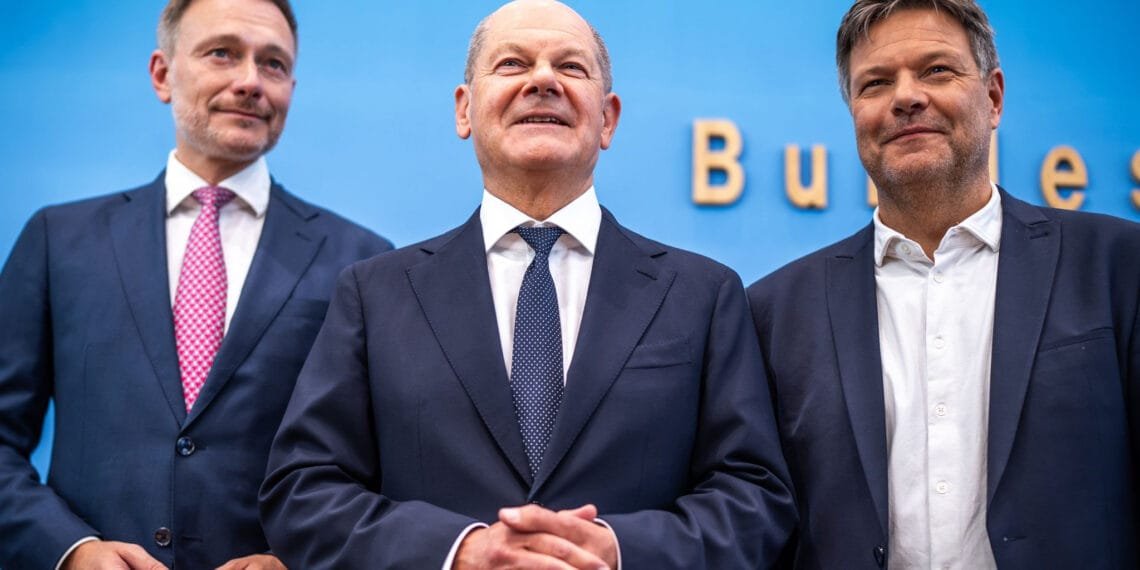Leaders of Germany’s three-party coalition, at the weekend, achieved a major breakthrough in negotiations on the 2025 national budget, thereby ending weeks of wrangling over the finances of Europe’s largest economy.
Leaders of the coalition, Chancellor Olaf Scholz of the Social Democratic Party (SPD), Economy Minister, Robert Habeck of the Greens and Finance Minister, Christian Lindner of the pro-business Free Democratic Party (FDP), reached a preliminary deal on a financial plan to try and secure additional economic growth of over 0.5 percent next year.
It plans to stick with stringent rules against ordinary budget deficits, known as the debt brake, banking on a significant increase in economic output worth an estimated €26 billion ($28 billion) and an €11 billion supplementary budget to overcome shortfalls in government spending.
The breakthrough on the €481 billion budget came after weeks of negotiations continued through the night on Thursday, July 4, 2024 with Scholz saying: “Sleep is overrated.” The three leaders convened a press conference in Berlin to share the details of the deal.
Scholz, Habeck and Lindner had originally planned to reach an agreement by Wednesday, July 3, and are now aiming to present a draft budget at a Cabinet meeting on July 17.
The German News Service (as delivered by dpa) reports that the Bundestag, the lower house of the German parliament, is due to begin debating the draft budget from mid-September, and it could be approved as early as November.
The draft budget incorporated a growth plan for Germany as the coalition’s new financial plan aims to kick-start a German economy that has struggled since the Coronavirus pandemic. Business associations have long complained about hurdles to growth, including a high tax burden, a shortage of skilled labour and excessive bureaucracy.
Meanwhile, left-wing critics blame the debt brake- enshrined in the German Constitution in 2009 in the wake of the financial crisis – for preventing key investments in infrastructure and education.
The key sticking point during the negotiations was the multibillion-euro deficit in government expenditure, with Lindner’s FDP refusing to ignore the debt brake to allow for additional borrowing and investments and the SPD ruling out any cuts in welfare spending.
Lindner said the government would remain within the confines of the debt brake, while borrowing €44 billion for 2025 in a total budget spanning €481 billion in expenditure.
“We are easing the burden on citizens and companies,” the finance minister said at the press conference, while announcing tax relief for citizens worth €23 billion over the next two years.
Read Also: Seplat Energy canvasses optimization of Nigeria’s sub-surface potential
Expenditure on child welfare is also set to be extended, with the emergency child allowance for families in need rising by €5 in 2025, while the government plans to invest €2 billion in improving the quality of daycare centres over the next two years.
It also made provision for incentives for the unemployed and foreign workers. The core of the new deal aims to address several issues to encourage economic growth, including incentivizing long-term unemployed people to re-enter the labour market and attracting foreign workers by reducing bureaucratic hurdles.
Employer contributions to pension and unemployment insurance for employees already drawing a pension will be directly paid out as wages in the future to provide incentives for increased employment.
Welfare spending is set to be improved with “start-up funding,” to encourage long-term unemployed people to keep more of their earnings in their first year in a new job without losing benefits. In addition, tax-free allowances are to be increased and the income tax rate adjusted to inflation, while a tax exemption for overtime is also to be introduced.
German businesses are also set to benefit from billions of euros worth of tax breaks with Scholz saying the new financial plan will allow businesses to deduct investments and research expenditure from their tax bills, while applying for subsidized loans from the state KfW investment bank to encourage economic growth.
Habeck said the deal would bring about a “new economic dynamism” in Germany. The economy minister singled out reforms to allow foreign nationals to take up employment in Germany more quickly. In addition, electricity price subsidies are to be extended until 2030.
In his defense of military spending, Scholz promised that spending on the German armed forces will be maintained, after the terms of the preliminary deal showed only a modest increase for the Bundeswehr.
The new agreement proposed a €1.2-billion rise for the armed forces, far below the €6 billion increase demanded by Defence Minister Boris Pistorius.
Scholz said the Bundeswehr’s regular budget would reach €80 billion ($87 billion) after 2028, when the emergency €100 billion special fund for the armed forces – agreed in the aftermath of Russia’s full-scale invasion of Ukraine in 2022-is spent.
The chancellor said the €80 billion would ensure Germany reaches the NATO threshold of spending 2 percent of GDP on defence, while Bundeswehr’s current regular budget stands at €52 billion, Scholz defended the deal in Berlin on Friday July 5, saying: “It is about a strong defence, a strong Bundeswehr that offers protection against the aggressive rulers of our time.”
Meanwhile, the opposition maintained that the coalition knockout is only being ‘postponed.’ Leading opposition figure Markus Söder of the Bavarian-based Christian Social Union (CSU) said the deal would not be sufficient for a fundamental turnaround in the German economy, nor to reverse the fortunes of the crisis-hit coalition.
“I don’t think that will be enough. The knockout has only been postponed,” he said.






